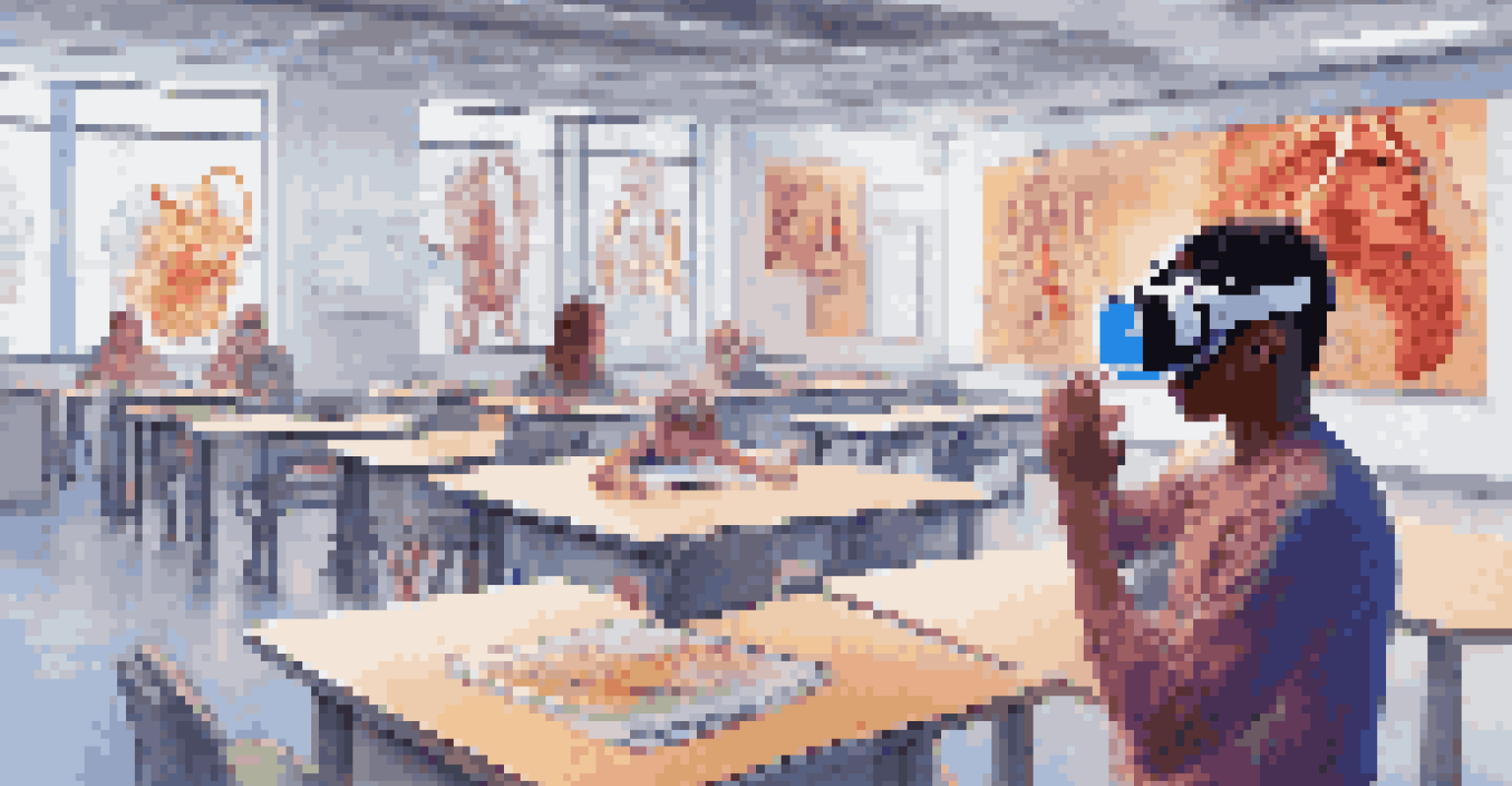The Future of Adaptive Learning: Innovations on the Horizon

Understanding Adaptive Learning: A Quick Overview
Adaptive learning is a personalized approach to education that tailors the learning experience to individual students' needs. It leverages technology to continually assess a learner's progress and adjust the content accordingly. This method ensures that students engage with material that's neither too easy nor too challenging, fostering a more effective learning environment.
The future of learning is not about the technology itself, but how we can use it to enhance the human experience.
For instance, imagine a student struggling with algebra. An adaptive learning platform can identify their specific weaknesses and provide targeted exercises to help them improve. This bespoke educational experience contrasts sharply with traditional one-size-fits-all methods, which often leave some students behind.
As we look toward the future, understanding the fundamentals of adaptive learning will allow educators and learners to harness its full potential. With technology advancing rapidly, the possibilities for more customized learning experiences are expanding.
AI and Machine Learning: The Driving Force Behind Adaptivity
Artificial Intelligence (AI) and machine learning are at the heart of adaptive learning innovations. These technologies analyze vast amounts of data to identify patterns in student performance, enabling systems to personalize learning paths effectively. This means that as students progress, the system learns and evolves, continuously refining its approach.

For example, imagine an online math tutor powered by AI that tracks a student's progress over weeks. It can suggest resources and adjust difficulty based on the student's learning speed. This level of responsiveness was unimaginable just a few years ago, highlighting the rapid evolution of educational tools.
Personalized Learning Experiences
Adaptive learning tailors education to individual needs, ensuring students engage with appropriately challenging material.
As AI becomes more sophisticated, we can expect even more personalized learning experiences. This not only helps students master subjects but also fosters a love of learning by keeping them engaged and challenged.
Gamification: Making Learning Engaging and Fun
Gamification is another exciting trend in adaptive learning that adds an element of fun to education. By incorporating game-like elements such as points, badges, and leaderboards, learners are more motivated to engage with the material. This approach can be particularly effective for younger students who thrive in interactive environments.
Education is the most powerful weapon which you can use to change the world.
Consider a language learning app that uses gamification to teach vocabulary. Users earn rewards for completing lessons and can compete with friends, creating a social aspect that enhances motivation. Such strategies not only make learning enjoyable but also encourage consistent practice.
As we look ahead, gamified adaptive learning tools are likely to become more prevalent, appealing to diverse learning styles while making education a more enjoyable experience for everyone.
The Role of Data Analytics in Personalized Learning
Data analytics plays a crucial role in the success of adaptive learning systems. By collecting and analyzing data on student interactions and performances, educators can gain valuable insights into individual learning behaviors. This information is essential for tailoring educational experiences to meet each student's unique needs.
For example, a teacher using data analytics might discover that a student excels in reading comprehension but struggles with math. This insight allows the teacher to provide additional support in math while continuing to challenge the student in reading. Such tailored support can significantly enhance learning outcomes.
Role of AI in Education
AI and machine learning enable adaptive systems to analyze student data, creating customized learning paths that evolve with each learner.
Going forward, the integration of robust data analytics in adaptive learning platforms will empower educators to make informed decisions that drive student success.
Integrating Virtual and Augmented Reality in Education
Virtual reality (VR) and augmented reality (AR) are transforming the landscape of adaptive learning by offering immersive experiences. These technologies allow students to engage with content in ways that were previously unimaginable, such as exploring ancient civilizations or conducting virtual science experiments. This hands-on approach can cater to various learning styles and enhance comprehension.
Imagine a biology student using AR to visualize complex cellular structures in 3D. This interactive experience can deepen understanding and retention far beyond traditional textbook learning. As these technologies become more accessible, their integration into adaptive learning will likely grow.
As we look to the future, the combination of adaptive learning and immersive technologies promises to create more engaging and effective educational experiences for all learners.
The Importance of Accessibility in Adaptive Learning
Accessibility is a vital consideration in the evolution of adaptive learning. As educational technology continues to advance, it’s imperative that these tools are designed with all learners in mind, including those with disabilities. Adaptive learning platforms that prioritize accessibility ensure that everyone has the opportunity to succeed.
For instance, features like text-to-speech, customizable interfaces, and alternative assessments can make a world of difference for students with varying needs. By creating inclusive environments, adaptive learning fosters a sense of belonging and encourages all students to thrive.
Importance of Accessibility
Ensuring adaptive learning tools are accessible to all, including students with disabilities, fosters inclusivity and equal opportunities for success.
Looking ahead, we must continue to advocate for accessibility in educational technology. Ensuring that adaptive learning tools are usable for everyone will be crucial to maximizing their potential.
The Future of Educators in an Adaptive Learning Landscape
As adaptive learning technologies evolve, the role of educators will also transform. Instead of merely delivering content, teachers will become facilitators and guides, helping students navigate personalized learning paths. This shift allows educators to focus more on fostering critical thinking and creativity while technology handles content delivery.
For example, a teacher might spend less time lecturing and more time working one-on-one with students who need extra support. This tailored approach can help build stronger relationships and enhance the overall learning experience. The teacher's role as a mentor becomes more pronounced in this new landscape.

Looking to the future, the collaboration between educators and adaptive learning technologies will create richer, more engaging educational experiences, preparing students for the complexities of the world ahead.
Challenges and Considerations for Adaptive Learning's Future
Despite the promising future of adaptive learning, several challenges must be addressed. Concerns regarding data privacy, the digital divide, and the potential for over-reliance on technology are critical issues that need careful consideration. As we integrate more technology into education, we must also ensure that it serves all students equitably.
For instance, while some students may thrive in a tech-driven learning environment, others may struggle without adequate support or resources. Ensuring access to technology and training for both students and educators is essential to bridging these gaps.
As we move forward, it’s crucial to balance innovation with responsibility, ensuring that adaptive learning technologies enhance education without compromising ethical standards or inclusivity.